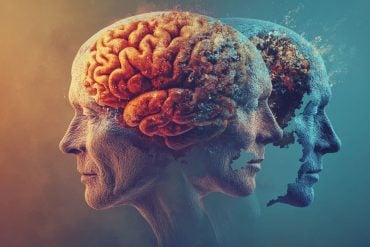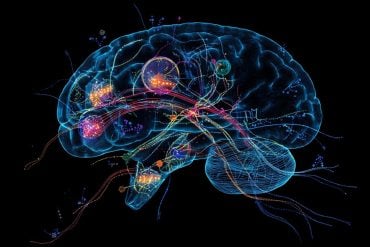Summary: Researchers report, contrary to popular belief, Adderall and other ADHD drugs do not improve cognition in healthy college students. Instead, they may impair cognitive function.
Source: University of Rhode Island.
Contrary to popular belief across college campuses, attention deficit hyperactivity disorder (ADHD) medications may fail to improve cognition in healthy students and actually can impair functioning, according to a study by researchers at the University of Rhode Island and Brown University.
Study co-investigators Lisa Weyandt, professor of psychology and a faculty member with URI’s George and Anne Ryan Institute for Neuroscience, and Tara White, assistant professor of research in behavioral and social sciences at Brown University, had anticipated different findings. “We hypothesized that Adderall would enhance cognition in the healthy students, but instead, the medication did not improve reading comprehension or fluency, and it impaired working memory,” she said. “Not only are they not benefitting from it academically, but it could be negatively affecting their performance.”
This first-ever multisite pilot study of the impact of so-called “study drugs” on college students who do not have ADHD comes at a time when use of prescription stimulants such as Adderall, Ritalin and Vyvanse is common among young adults who believe the drugs will improve their academic performance. Research by Weyandt and others has estimated that 5 to 35 percent of college students in the United States and European countries without ADHD illegally use these controlled substances, buying or receiving them from peers, friends, or family.
Results of the new study, published last month in the journal Pharmacy, show that the standard 30 mg dose of Adderall did improve attention and focus — a typical result from a stimulant — but that effect failed to translate to better performance on a battery of neurocognitive tasks that measured short-term memory, reading comprehension and fluency.
Weyandt has a theory about why working memory would be adversely affected by the medication. Brain scan research shows that a person with ADHD often has less neural activity in the regions of the brain that control executive function — working memory, attention, self-control. For people with ADHD, Adderall and similar medications increase activity in those regions and appear to normalize functioning. “If your brain is functioning normally in those regions, the medication is unlikely to have a positive effect on cognition and my actually impair cognition. In other words, you need to have a deficit to benefit from the medicine,” Weyandt said.
Participants in the study also reported their perceived effects of the drug and its impact on their emotions, with students reporting significant elevation of their mood when taking Adderall.
In contrast to the small, mixed effects on cognition, the drug had much larger effects on mood and bodily responses, increasing positive mood, emotional ratings of the drug effect, heart rate and blood pressure. “These are classic effects of psychostimulants,” said White. “The fact that we see these effects on positive emotion and cardiovascular activity, in the same individuals for whom cognitive effects were small or negative in direction, is important. It indicates that the cognitive and the emotional impact of these drugs are separate. How you feel under the drug does not necessarily mean that there is an improvement in cognition; there can be a decrease, as seen here in young adults without ADHD.”

The physical effects from the drugs, such as increased heart rate and blood pressure, were expected, and underscored the difference with cognition. “They are subjecting themselves to physiological effects but do not appear to be enhancing their neurocognition,” Weyandt said. She stressed, however, that the findings are based on a pilot study and need to be replicated with a substantially larger sample of college students.
The researchers recruited students from both universities, eliminating individuals who had taken ADHD medications or other drugs. After rigorous health screenings, 13 students participated in two five-hour sessions at White’s lab at Brown and at Memorial Hospital in Pawtucket.
In the double-blind study, in which neither researchers nor participants know who is receiving the placebo and who is receiving the study medication, each student received Adderall in one session and the placebo in the other. This allowed the researchers to see the effects of the medication vs. placebo in individuals and across the group.
Given the important and unexpected results from the study, Weyandt and White plan to apply for federal funding to continue the research with a larger group of healthy college students.
Funding: This research was supported by grants from the Rhode Island Neuroscience Collaborative, the Brown (now Carney) Institute for Brain Science, the George and Anne Ryan Institute for Neuroscience and the Norman Prince Neurosciences Institute at Rhode Island Hospital as well as divisions within the National Institutes of Health and the National Science Foundation.
Source: Carol McCarthy – University of Rhode Island
Publisher: Organized by NeuroscienceNews.com.
Image Source: NeuroscienceNews.com image is in the public domain.
Original Research: Open access research for “Neurocognitive, Autonomic, and Mood Effects of Adderall: A Pilot Study of Healthy College Students” by Lisa L. Weyandt, Tara L. White, Bergljot Gyda Gudmundsdottir, Adam Z. Nitenson, Emma S. Rathkey, Kelvin A. De Leon and Stephanie A. Bjorn in Pharmacy. Published June 27 2018.
doi:10.3390/pharmacy6030058
[cbtabs][cbtab title=”MLA”]University of Rhode Island”ADHD Drugs Do Not Improve Cognition in Healthy College Students.” NeuroscienceNews. NeuroscienceNews, 19 July 2018.
<https://neurosciencenews.com/adhd-drugs-cognition-9580/>.[/cbtab][cbtab title=”APA”]University of Rhode Island(2018, July 19). ADHD Drugs Do Not Improve Cognition in Healthy College Students. NeuroscienceNews. Retrieved July 19, 2018 from https://neurosciencenews.com/adhd-drugs-cognition-9580/[/cbtab][cbtab title=”Chicago”]University of Rhode Island”ADHD Drugs Do Not Improve Cognition in Healthy College Students.” https://neurosciencenews.com/adhd-drugs-cognition-9580/ (accessed July 19, 2018).[/cbtab][/cbtabs]
Abstract
Neurocognitive, Autonomic, and Mood Effects of Adderall: A Pilot Study of Healthy College Students
Prescription stimulant medications are considered a safe and long-term effective treatment for Attention Deficit Hyperactivity Disorder (ADHD). Studies support that stimulants enhance attention, memory, self-regulation and executive function in individuals with ADHD. Recent research, however, has found that many college students without ADHD report misusing prescription stimulants, primarily to enhance their cognitive abilities. This practice raises the question whether stimulants actually enhance cognitive functioning in college students without ADHD. We investigated the effects of mixed-salts amphetamine (i.e., Adderall, 30 mg) on cognitive, autonomic and emotional functioning in a pilot sample of healthy college students without ADHD (n = 13), using a double-blind, placebo-controlled, within-subjects design. The present study was the first to explore cognitive effects in conjunction with mood, autonomic effects, and self-perceptions of cognitive enhancement. Results revealed that Adderall had minimal, but mixed, effects on cognitive processes relevant to neurocognitive enhancement (small effects), and substantial effects on autonomic responses, subjective drug experiences, and positive states of activated emotion (large effects). Overall, the present findings indicate dissociation between the effects of Adderall on activation and neurocognition, and more importantly, contrary to common belief, Adderall had little impact on neurocognitive performance in healthy college students. Given the pilot design of the study and small sample size these findings should be interpreted cautiously. The results have implications for future studies and the education of healthy college students and adults who commonly use Adderall to enhance neurocognition.






